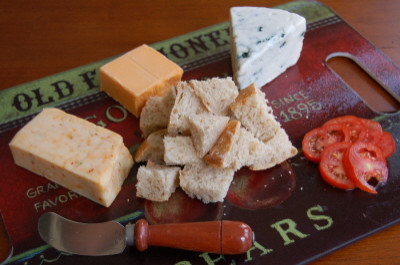Artisanal Cheese Makers And FDA Spar Over Unlikely Issue Of Wooden Boards

Cheese lovers, producers and retailers have banded together in a fight against the U.S. Food and Drug Administration in recent days. Their ire arose from the revelation over the weekend that an FDA official made a statement in January that suggested it would go after manufacturers who age or cure cheeses on wooden boards.
The FDA is now taking steps to soften its stance on the use of wood in the cheesemaking process, but many artisanal cheese manufacturers are still uneasy over lingering ambiguities.
The initial remarks, which were included in a letter from Monica Metz, head of dairy and eggs for the FDA’s Office of Food Safety, to the New York State Agricultural Department, seemed to portend a crackdown on what has long been a prominent feature in the manufacture of traditional cheeses around the world.
“Wooden shelves or boards cannot be adequately cleaned and sanitized," Metz wrote. "The porous structure of wood enables it to absorb and retain bacteria, therefore bacteria generally colonize not only the surface but also the inside layers of wood.
“The shelves or boards used for aging make direct contact with finished products; hence they could be a potential source of pathogenic microorganisms in the finished products.”
The response to the emergence of the Metz quote on the blog Cheese Underground on Saturday was swift and brutal. The American Cheese Society, an industry group representing 1,500 businesses, released a position statement opposing the banning of wood from the cheesemaking process. And artisanal cheese manufacturers almost unanimously balked at the news.
“It’s a potential game-changer for the face of artisan cheeses in the United States,” Chris Roelli, owner of Wisconsin’s Roelli Cheese Haus, which ages 85 percent of its cheeses on wooden boards, told the Wisconsin State Journal. “I obviously have a lot riding on this because my niche is on cellar-curing cheeses, so I’m worried about it.”
The outcry was fierce enough to compel the FDA to issue a statement earlier this week that back some of the language in the Metz letter.
“The FDA does not have a new policy banning the use of wooden shelves in cheesemaking, nor is there any FSMA requirement in effect that addresses this issue,” the statement reads in part. “Moreover, the FDA has not taken any enforcement action based solely on the use of wooden shelves.”
The statement goes on to explain that the FDA will “engage with the artisanal cheesemaking community” in hopes of figuring out which, if any, wood-aged cheese varieties can be safely manufactured, a fact that Nora Weiser, executive director at the American Cheese Society, welcomed.
But that statement left much open to interpretation, and didn't go as far as to say that the FDA won't bar the use of wood in cheesemaking, or take enforcement actions against manufacturers who continue to age their cheeses on wood. And FDA spokeswoman Laura Sucher declined to answer that question, or to otherwise expand on the statement in a telephone conversation, beyond stating that "the FDA doesn't discuss potential enforcement actions.”
The FDA followed up with yet another official update to the policy Wednesday evening, a move that reflects the agency's awareness that it has touched a hot nerve within a passionate industry.
"To be clear, we have not and are not prohibiting or banning the long-standing practice of using wood shelving in artisanal cheese," the FDA wrote, though it still left an opening to potentially do just that:
"The FDA’s current regulations state that utensils and other surfaces that contact food must be 'adequately cleanable' and 'properly maintained.' Historically, the FDA has expressed concern about whether wood meets this requirement and these concerns have been noted in its inspectional findings. However, the FDA will engage with the artisanal cheesemaking community, state officials and others to learn more about current practices and discuss the safety of aging certain types of cheeses on wooden shelving."
That ambiguity leaves cheese producers and consumers in the lurch, Weiser said.
“It does still lack some clarity and I think that a lot of the issue around this stems from miscommunication at the FDA and all around the issue. So imagine that if you are a producer small or large and you’re passionate and selling a safe product -- you don’t know what you can or can’t do,” she said.
“People are investing tens of thousands of dollars to create the proper environment to create their cheeses without knowing, and that’s a huge concern. When you’re doing something and want to do it right and no one can tell you what is right, that leaves you somewhat floundering.”
Wood has been used for such purpose for centuries, and many cheese-heads swear by wood-aged cheeses, saying it produces the finest flavors in a wide range of varieties.
But in June 2012, the FDA inspected Finger Lakes Farmstead Cheese of Mecklenburg, N.Y., and found that a number of cheeses manufactured there were contaminated with the deadly Listeria bacteria due to improper sanitization of wooden boards used to age them, according to the FDA.
The case made waves throughout the food industry, and the cheese manufacturer was shut down in April 2014, when a federal judge ruled that the company had failed to take necessary steps to improve its sanitation measures and ensure that its products were safe to consume, the FDA said.
© Copyright IBTimes 2025. All rights reserved.





















